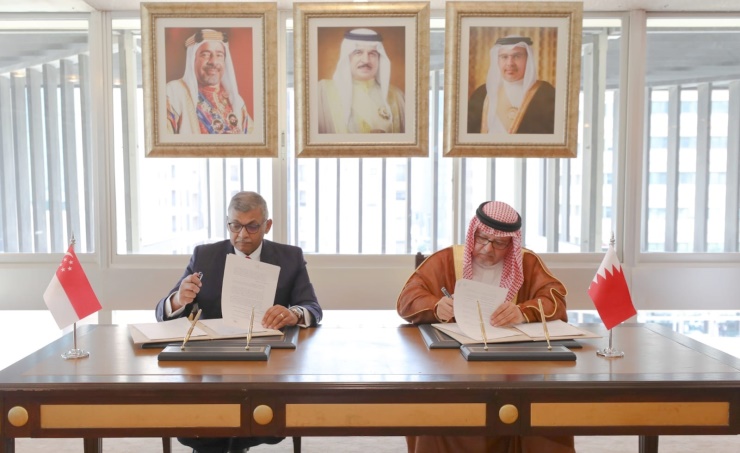Manama : The Supreme Judicial Council (SJC) of the Kingdom of Bahrain and the Supreme Court of Singapore (SCS) are exploring a collaboration framework to support Bahrain in establishing Bahrain International Commercial Court (BICC), an international commercial court for the resolution of transnational commercial disputes.
BICC will be based principally on the model of the Singapore International Commercial Court (SICC), a joint SJC-SCS statement announced.
Chief Justice Shaikh Khaled bin Ali Al Khalifa, Vice President of the SJC and President of the Court of Cassation and Singapore Chief Justice Sundaresh Menon signed a Memorandum of Understanding (MoU) and a Memorandum of Guidance (MoG) as to the Enforcement of Money Judgments.
Chief Justice Menon was in Bahrain on a two-day visit, May 8-9, where he met His Royal Highness Prince Salman bin Hamad Al Khalifa, Crown Prince and Prime Minister, Chief Justice Shaikh Khaled bin Ali Al Khalifa, Vice President of the SJC and President of the Court of Cassation, and Nawaf bin Mohamed Al-Moawda, Minister of Justice, Islamic Affairs and Endowments.
The MoU and MoG are the first to be signed between the SJC and the SCS, further strengthening the ties between the respective judiciaries and countries.
The MoU enhances cooperation between the respective judiciaries to promote the efficient administration of justice.
It affirms both parties’ commitment to exchange experiences and develops the institutional and judicial capacity to ensure the effective resolution of cross-border commercial disputes, including alternative dispute resolution, the SJC-SCS statement said.
The MoU also aims to strengthen collaboration in judicial training by facilitating mutual visits. The MoG seeks to establish guiding principles for the procedures and requirements to enforce money judgments issued by the Courts of each country in the Courts of the other, the statement added.
The collaboration was initiated by a visit led by Chief Justice Shaikh Khaled bin Ali Al Khalifa where he met Chief Justice Menon in Singapore in October 2022, with the intent to better understand Singapore’s experience in building an international dispute resolution hub.
To facilitate the BICC establishment, working groups in the respective courts, led by Justice Philip Jeyaretnam, President of the SICC, and Chief Justice Khaled bin Ali, were established.
Chief Justice Khaled bin Ali affirmed that this unprecedented collaboration between Bahrain and Singapore to support the establishment of the BICC reflects the Bahrain judiciary’s excellent relationship with the Singapore judiciary and advances a common aspiration of both judiciaries to develop and promote efficient dispute resolution mechanisms for transnational disputes.
“Through collaboration with the Singaporean judiciary, it is hoped that the BICC will work alongside the SICC to provide a global approach that maintains parties’ autonomy in its core, and to provide impartial and effective justice that meets the expectations of the international business community. The BICC-SICC collaboration aims to provide a complete ecosystem for regional and international dispute resolution together with arbitration and mediation,” he added.
Chief Justice Menon said: “It was a great honour for me and my entire delegation to receive the warm and gracious hospitality extended to us by our hosts in Bahrain, in particular His Royal Highness Prince Salman bin Hamad Al Khalifa and Chief Justice Shaikh Khaled bin Ali.”
He added that during his visit to Bahrain, the two judiciaries marked the start of a significant project to enter into a collaboration to support the establishment of the BICC, entered into important instruments that significantly enhance bilateral judicial cooperation, and engaged in an insightful and topical Roundtable discussion of new and emerging trends in international commercial disputes.
These substantial achievements have laid a firm foundation for future collaboration between the Singapore and Bahrain judiciaries, he said.
On the second day of his visit, Chief Justice Menon delivered a lecture entitled “The Transnational System of Commercial Justice and the Place of International Commercial Courts”. In his lecture, Chief Justice Menon addressed the rise, role and features of the transnational system of commercial justice (TSCJ), explained the central place of international commercial courts (ICCs) within the TSCJ, and how ICCs can transform their jurisdictions into key nodes of dispute resolution in the TSCJ.
BICC’s establishment is a component of Bahrain’s ambition to build an international commercial dispute resolution hub with a state-of-the-art infrastructure that can capitalise on the region’s strong economic growth.
BICC builds on the effective dispute resolution mechanisms already present in Bahrain, particularly, the Bahrain Chamber for Dispute Resolution and the latest amendments to adjudicate commercial disputes in English.
Bahrain recently appointed Court of Cassation (Supreme Court of Bahrain) judges that are internationally renowned in commercial dispute resolution. The judges will also sit on applications for the recognition and annulment of high-value arbitral awards and ancillary proceedings related to arbitration.
As a forum for the resolution of international commercial disputes, the SICC has established a reputation as a leading and trusted neutral forum for efficient and effective international commercial dispute resolution. In the Singapore International Dispute Resolution Academy International Dispute Resolution Survey 2022, which surveyed in-house counsel, dispute resolution lawyers, corporate lawyers and corporate executives from 25 countries, the SICC has been voted the most used international commercial court globally.
The SICC bench is comprised of a diverse panel of eminent international and local Judges from civil law and common law traditions, experienced in adjudicating specialist commercial disputes. Described as “arbitration in litigation”, the SICC combines the best practices of international arbitration with the substantive principles of international commercial law, to offer procedures compatible with, and responsive to, the fast-changing needs and realities of international commerce.


